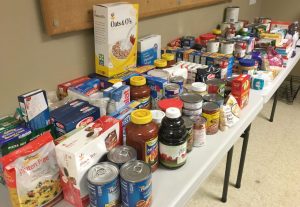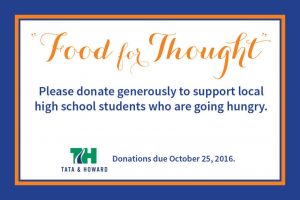National Food Bank Week occurs annually during the week that contains October 16, which is World Food Day. World Food Day, first established in 1979, marks the formation of the Food and Agriculture Organization of the United Nations (FAO) on October 16, 1945. While World Food Day aims to bring global progress to food supplies and the impact of climate change, and has a lofty and noble goal of Zero Hunger by 2030, National Food Bank Week focuses more on the immediate need of those around us.
What is a Food Bank?

Food banks are non-profit organizations that collect multiple tons of food every year, which they then distribute to local food pantries and hunger relief charities. Food banks provide for collection and storage of food, but they do not typically distribute directly to those in need. Rather, they distribute to smaller agencies that have direct contact with those in need, but do not themselves have the means or the room for food collection.
Food banks collect food from a variety of sources. Grocery stores and wholesalers donate thousands of pounds of food that would otherwise be thrown away, and smaller organizations provide food and monetary donations through food drives, hunger walks, and other charitable measures. Food banks also accept food donated from individuals and families – the only caveat is that the food must not be expired.
Typically found in larger communities, food banks are almost fully reliant on volunteers and donors to help with day-to-day operations. Location has a huge impact on the functionality of each food bank, as more rural areas require smaller banks that distribute across larger distances, whereas large, urban areas require very large facilities to adequately support the serious need in those areas.
How Do Food Banks Work?
Food banks not only act as collection and distribution centers for food, they also serve as community leaders in assisting the diverse populations of those who are hungry. Food banks interact with elected officials and work towards legislation that supports hunger programs while also examining the contributing factors of poverty and hunger. Food banks then work to create and implement programs for clients, donors, and agencies that best respond to the local need.
There are myriad reasons why an individual is hungry. Job loss, medical crisis, low wages, and divorce are just a few of the reasons why a person or family may find themselves in need. And while the cause of hunger is of primary concern to food banks and how they best operate, answering the need should be the only concern of those of us fortunate enough to not be hungry.
How We Can Help

Food banks are always in need of donations and volunteers. During the holiday season, food banks receive more donations than they do during the rest of the year, which allows them to provide for the significant amount of holiday hunger. However, it is important to note that hunger happens year-round, and that food donations are always gladly accepted. Bringing a few bags of healthy, non-perishable food to the local food bank during the spring, summer, and fall months is an easy and affordable way to make a positive impact in the local community.
One of the best ways to make a big impact with minimal effort is to hold a food drive at the office. When a large group of people comes together to donate food, the amount collected adds up quickly. To collect even more food, consider creating groups within the organization and having a contest to see which group brings in the most pounds of food or fills the most boxes. A little friendly competition not only brings in a significantly larger amount of food, but also brings employees together, creating a positive atmosphere of teamwork and philanthropy.
In Conclusion
National Food Bank Week is an excellent time to reflect on the serious amount of hunger around us, and to come together to help provide for those in need. It is also a perfect time to get to know your local food bank, and to find out what types of donations they most need and how to most effectively help. Whether donating food, volunteering time, or providing financial support, food banks welcome any help they are given, particularly as we approach the holiday season. To find a local food bank, please visit www.feedingamerica.org/find-your-local-foodbank.
